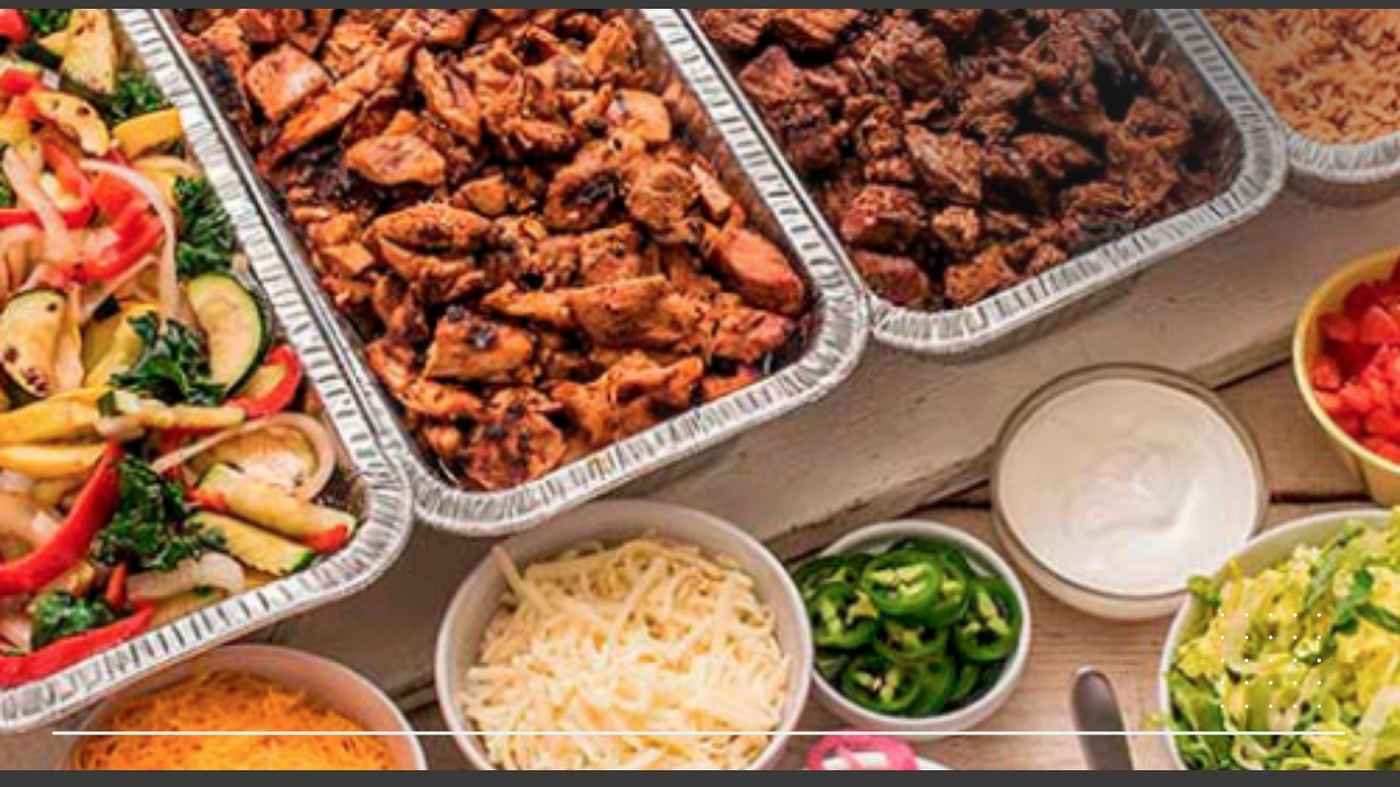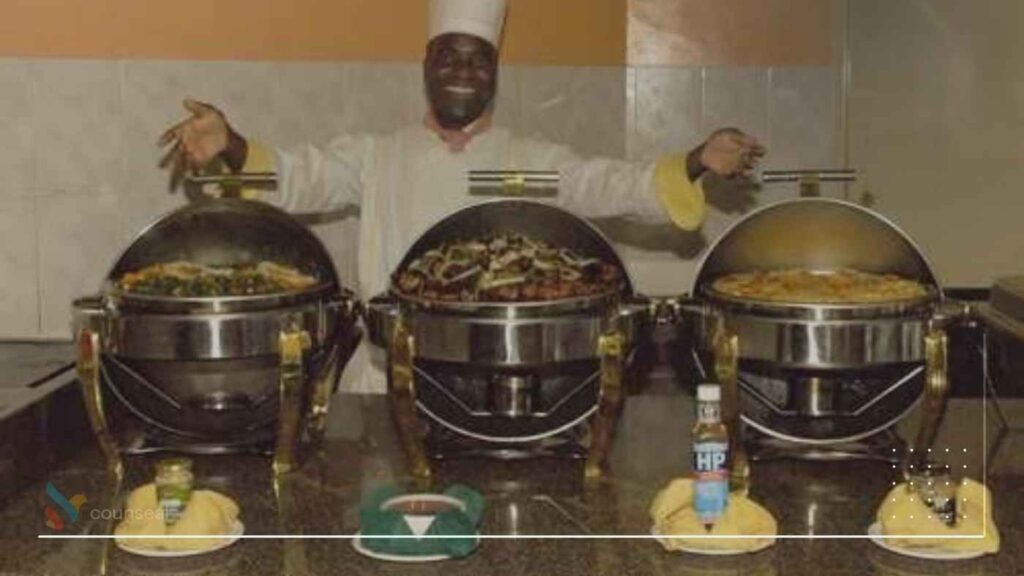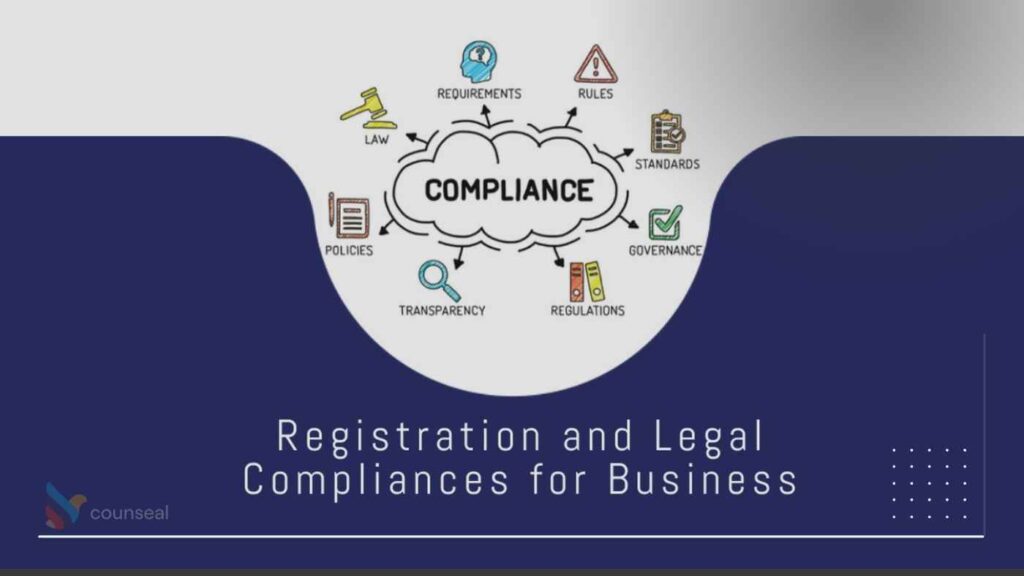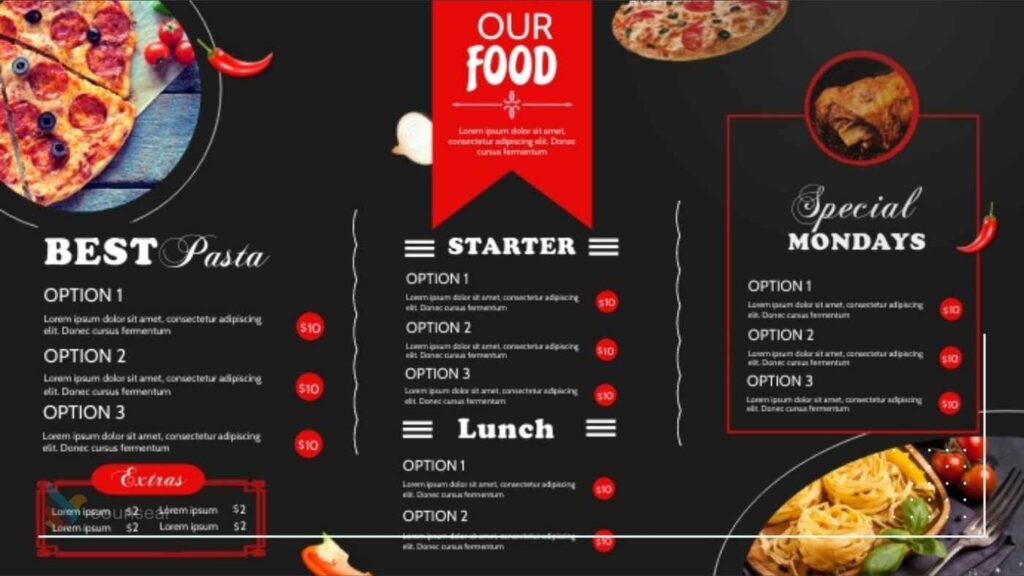How To Start A Catering Business In Nigeria

by Counseal Team
Updated July 22, 2024

Catering in Nigeria is booming with countless opportunities for entrepreneurs and food enthusiasts. In this guide, we explore the secrets to success in the industry, from insider tips on navigating the competitive market to knowledge of culinary trends and customer preferences.
When you’re done with this guide, you will be ready to unlock the possibilities of the thriving catering landscape of Nigeria!
Ready? Let’s go.
- What Is a Catering Business?
- Types of Catering Business
- 1. Understand the Nigerian Catering Market: Trends and Opportunities
- 2. Identify Your Target Audience: Finding Your Niche in the Industry
- 3. Craft a Winning Business Plan: Essential Steps for Success
- 4. Get Funding
- 5. Set Up Your Catering Business: Legal and Licensing Requirements
- 6. Build a Stellar Menu: Navigating Nigerian Cuisine and Dietary Preferences
- 7. Get Quality Ingredients: Sourcing Suppliers and Establishing Relationships
- 8. Price Your Services: Strategies for Profitability and Attracting Clients
- 9.Marketing and Brand: Techniques for Catering Businesses
- 10. Ensure Food Safety and Hygiene: Best Practises for Catering Operations
- 11. Leverage Technology: Streamlining Operations with Catering Software
- Frequently Asked Questions
Quick Takes
How much does it cost to start this business?
This depends on the type of cleaning business you choose to run. On average, it will cost around N50,000 to purchase essential equipment. If you decide to run on a large scale, your budget will be higher based on the required equipment.
How much can you make per month?
We cannot predict this as it is solely based on the quantity of clients you service.
What’s the minimum required to start the business?
If you are starting small at no cost, you can clean for clients who will provide all the cleaning materials you need. Your fee will, however, be cheaper than that of those who work with their own cleaning equipment.
What are the best states in Nigeria to start a cleaning business?
-
- Federal Capital Territory
- Lagos State
- Rivers State
- Ogun State
What are the known examples of a cleaning business?
- Residential Cleaning, e.g. Squeaky Cleaners
- Commercial Cleaning, e.g. So-Kleen Ltd
- Industrial cleaning, e.g. Nigeria Cleaning services.
- Dry Cleaning, e.g. CleanEat Services
Before we start with the steps, first let’s understand the catering business
What Is a Catering Business?

A catering business is a service-oriented venture that provides food and beverage options for events, parties, weddings, and other gatherings. It involves planning menus, sourcing ingredients, cooking or preparing the food, as well as delivering and serving it to clients’ specifications.
It can range from small-scale operations offering specific cuisines or styles of dining to larger companies with a wider range of menu options.
Operating a successful catering business requires more than just culinary skills. It demands attention to detail in terms of organisation, logistics, customer service, and marketing.
To stay competitive in this industry, you need to understand customer preferences and culinary trends and adapt quickly to changing market needs..
Types of Catering Business
We can classify catering businesses into four major types:
Event Catering
Event caterers focus on providing food and beverage services for various events, such as conferences, seminars, trade shows, and fundraisers. They often collaborate closely with event planners to create customised menus that meet specific requirements.
Corporate Catering
Corporate caterers specialise in providing meals for business-related events, like meetings, conferences, training sessions, or office parties. Their services may include breakfasts or lunches delivered directly to the workplace or on-site cooking at the venue.
Wedding Catering
Wedding caterers play a crucial role in creating memorable dining experiences during weddings by offering multiple course meals and exquisite presentation.
Social Catering
Last, social caterers offer their services for private gatherings such as birthday parties or family reunions. They develop menus based on clients’ preferences, ensuring seamless execution of the catering process throughout the entire event.
Each type of catering business requires specific skills and knowledge to succeed in Nigeria’s thriving industry. Understanding customer trends and preferences while delivering high-quality culinary experiences tailored to each occasion’s demands can help entrepreneurs excel in this competitive market.
1. Understand the Nigerian Catering Market: Trends and Opportunities

Understanding the catering market in Nigeria, including current trends and opportunities, is essential for anyone looking to establish or expand a catering business in the country.
Here are some key trends and opportunities in the Nigerian catering market:
Trends:
Diverse Cuisine Offerings:
Nigerians have a diverse palate, and they appreciate a wide range of cuisines. Consider offering a menu that includes both local Nigerian dishes and international options to cater to various tastes.
Health and Dietary Preferences:
There is a growing awareness of health and dietary concerns in Nigeria. Consider offering healthier menu options, accommodating dietary restrictions, and using fresh, locally sourced ingredients.
Customization and Personalization:
Customised and personalised catering services are gaining popularity. Offer tailored menu options for different occasions and events, such as weddings, corporate meetings, and private parties.
Sustainability and Local Sourcing
Sustainability and eco-conscious choices are becoming more important to consumers. Highlight your use of locally sourced, sustainable ingredients in your catering offerings.
Food Presentation and Styling:
Food presentation and styling have a significant impact on customer perception. Stay updated on food styling trends and invest in an aesthetically pleasing presentation to make your catering stand out.
Tech Integration:
Embrace technology for online ordering, payment processing, and customer engagement. An efficient online presence and a user-friendly website can help you reach a broader audience.
Opportunities:
Corporate Catering:
Corporate events, meetings, and conferences provide a significant opportunity for catering businesses. Consider offering a range of corporate packages, from breakfast meetings to large corporate banquets.
Social Events:
Nigeria has a rich tradition of celebrations and social gatherings, such as weddings, birthdays, and traditional ceremonies. Capitalise on these events by offering specialised catering services.
Delivery and Takeout:
With the growth of food delivery services and the busy lifestyles of urban dwellers, there is a growing market for catering businesses to provide delivery and takeout options for office lunches and family gatherings.
Innovative Menu Offerings:
Introduce unique and innovative menu items or concepts that can set your catering business apart. For example, fusion cuisine or themed menus can be attractive to customers.
Healthy Eating and Special Diets:
Address the demand for healthy eating by offering a variety of nutritious and diet-specific catering options, including vegetarian, vegan, and gluten-free choices.
Event Planning and Coordination:
Expanding your services to include event planning and coordination can be a lucrative opportunity. Many clients prefer one-stop solutions for both catering and event management.
Collaborations and Partnerships:
Collaborate with event planners, venues, and local businesses to expand your customer base and create mutually beneficial partnerships.
Online Marketing and Social Media:
Utilise social media platforms and online marketing to showcase your catering services. Engage with customers through social media, post high-quality images, and share customer testimonials.
Training and Certification:
Consider offering catering training and certification programmes. This can be an additional source of revenue and can help raise the standards of catering in Nigeria.
Niche Markets:
Identify and cater to niche markets, such as high-end luxury events or specific cultural or dietary preferences. These markets may be less competitive and yield higher profit margins.
To succeed in the Nigerian catering market, it’s essential to stay informed about the latest trends, remain adaptable, and continuously focus on delivering high-quality food and service.
Building a powerful brand, maintaining an excellent reputation, and establishing strong customer relationships are also key to success in this industry.
2. Identify Your Target Audience: Finding Your Niche in the Industry

Identifying your target audience and finding your niche within the industry helps you establish yourself as a prominent figure in this flourishing field.
With the catering industry experiencing significant growth in Nigeria, it is crucial for aspiring professionals to understand their target audience. Identifying your target audience allows you to tailor your services specifically to meet their needs and preferences.
This includes understanding demographic information, such as age groups, income levels, and cultural backgrounds, that may influence their dining choices.
Finding your niche within the industry enables you to specialise in a specific area or offering that sets you apart from competitors.
Whether it’s focusing on vegan cuisine or special events like weddings or corporate gatherings, carving out a unique position in the market helps attract customers looking for specialised services.
3. Craft a Winning Business Plan: Essential Steps for Success

With the surge in opportunities, you need to strategize your approach to stand out from the competition. By following these guidelines, you can conquer hurdles and establish yourself as a prominent figure in this flourishing industry.
To achieve unprecedented success in Nigeria’s booming catering sector, it is crucial to have a well-crafted business plan that addresses all aspects of your venture.
To write a business plan, you need to:
- Do thorough market research to understand the local demand for different cuisines and services.
- Analyse your competitors’ strengths and weaknesses to help position yourself uniquely among established players.
Staying updated with current culinary trends is key to attracting customers who are seeking innovative dining experiences. Understanding consumer preferences, dietary restrictions, or local delicacies ensures you offer menus that cater to diverse tastes.
Overall, crafting a winning business plan requires constant adaptation along with a passion for delivering exceptional culinary experiences tailored for Nigerian clientele.
4. Get Funding

Getting funding is a crucial aspect of starting and growing a successful catering business in Nigeria.With the right financial resources, you can invest in essential equipment, hire skilled staff, and build a strong brand image to attract customers.
There are multiple avenues for entrepreneurs to secure funding, including government grants and loans specifically tailored for small businesses in the food industry.
To get funding for your catering business, it is important to have a solid business plan that outlines your vision, objectives, and financial projections. This document will show potential lenders or investors that you have done thorough research and are well-prepared for success.
An extensive knowledge of market trends and customer preferences can significantly enhance your chances of securing funding, as it shows how you plan to tap into current demand.
Overall, getting adequate funding is vital to jumpstarting your catering venture successfully or taking an existing one to new heights within Nigeria’s booming industry. You can take the following steps to boost your chances:
Compare Small Business Loans
Comparing small business loans is a prudent step when seeking funding for your catering business in Nigeria. Here’s how to go about it.
Identify Your Business Needs:
Determine the specific financial needs of your catering business. Calculate how much capital you require, how you plan to use it, and the repayment terms that best suit your cash flow.
Research Lenders:
Look for banks, credit unions, online lenders, and government programmes that offer small business loans in Nigeria. Gather a list of potential lenders.
Review Loan Options:
Explore the loan options offered by each lender, including their interest rates, loan terms, and fees. Consider the different loans available, such as term loans, lines of credit, or equipment financing.
Check Eligibility:
Ensure that you meet the eligibility criteria for each lender. This includes factors like your credit score, time in business, and revenue requirements.
Request Loan Quotes:
Reach out to the selected lenders to request loan quotes or prequalification offers. This will give you a clear idea of the terms and rates they can offer.
Compare Quotes:
Carefully review and compare the quotes from different lenders. Pay attention to the total cost of the loan, including interest and fees, as well as the monthly payments.
Read the Fine Print:
Always read the terms and conditions of the loan agreement. Look for hidden fees, prepayment penalties, and any clauses that may affect your ability to repay the loan.
Consider Additional Services:
Some lenders may offer value-added services, such as business consulting or support. Assess whether these services align with your business needs.
Seek Expert Advice:
If you’re unsure about which loan option is best for your catering business, consider consulting with a financial advisor or business mentor for guidance.
Comparing small business loans ensures you make an informed decision and select the best financing option for your business. Remember to prioritise affordability, favourable conditions, and a lender with an excellent reputation in the business.
Best Startup Business Loan Options for Entrepreneurs
Finding the right startup business loan is crucial as you venture into a new business. With many opportunities available, having access to financing can help kick start your venture and ensure its success. There are several loan options specifically tailored for startups in Nigeria, such as:
- micro-loans from banks or
- government programmes.
They both offer favourable repayment terms and low-interest rates.
There are other platforms, such as:
- Crowdfunding platforms. This is a popular alternative where entrepreneurs can reach out to potential investors who share their passion for food and hospitality.
- Traditional bank loans provide one option but require extensive documentation and collateral, which may be challenging for startups with limited assets or credit histories.
- peer-to-peer lending platforms offer a convenient way of acquiring funds through individual lenders willing to support promising catering ventures without demanding excessive requirements upfront.
By exploring these various funding options, you can choose the option that aligns best with your vision and financial capabilities.
Small-Business Grants: Where to Find Free Funding
Small-business grants are a valuable source of free funding for entrepreneurs looking to start or expand their ventures. These grants provide financial help with no repayment, making them an attractive option for small-business owners who may not qualify for traditional loans.
Finding these grants can be a challenge, but with diligent research and proper planning, you can uncover many opportunities. Start your search by exploring government programmes at various levels, such as federal, state, and local initiatives that are specifically designed to support small businesses.
Private foundations and nonprofit organisations often offer grants to entrepreneurs in specific industries or underrepresented communities.
To find small-business grants more easily, consider utilising online databases and resources dedicated to funding opportunities. We have compiled a short list of grants available in Nigeria.
Networking events and business associations can also be excellent sources of information about potential grant opportunities within your specific sector or geographic area.
While finding free funding through small-business grants may require time and effort, it is undoubtedly worth pursuing for those seeking financial support without the burden of debt repayment.
By leveraging the various resources available to you, from government programmes to online databases, you can increase your chances of securing much-needed funds to help grow your small business successfully.
5. Set Up Your Catering Business: Legal and Licensing Requirements

Setting up a catering business in Nigeria requires understanding and complying with certain legal and licencing requirements. The first step is to register your business with the Corporate Affairs Commission (CAC) as a limited liability company or any other legally recognised entity. This provides your business with a legal framework and protects your personal assets.
Next, you need to get the permits and licences from local authorities. This includes getting a certificate of fitness, which ensures that you meet health and safety standards for handling food. This mostly applies to Abuja and Lagos.
Your location determines whether you have to get this certificate and other permits. This is because different states have different laws. Do a little research to know what applies to your location.
It is crucial to comply with tax regulations by registering with the Federal Inland Revenue Service (FIRS) and getting a Tax Identification Number (TIN). Failure to do so can cause significant penalties.
By adhering to these legal and licencing requirements, you can establish your catering business on firm ground and ensure its long-term success in the thriving industry of Nigeria.
6. Build a Stellar Menu: Navigating Nigerian Cuisine and Dietary Preferences

To build a stellar menu in the Nigerian catering industry, it is essential to navigate the unique culinary landscape and dietary preferences of the country.
Nigerian cuisine is diverse and rich, with each region having its own signature dishes and flavours. Understanding these regional variations and incorporating them into your menu can help you appeal to a wider range of customers.
Besides regional differences, it’s important to consider dietary preferences when designing your menu.
Nigeria has a significant Muslim population, so offering halal options can be crucial for success. Vegetarian and vegan dishes are also becoming increasingly popular as people become more health-conscious.
By including a variety of options that cater to different dietary needs and preferences, you can ensure that there is something for everyone on your menu.
Overall, building a stellar menu in the thriving catering industry of Nigeria requires knowledge of both cultural nuances and changing trends in dietary preferences.
By embracing the diversity of Nigerian cuisine while accommodating various dietary needs, you can establish yourself as an authority in this booming sector while satisfying the appetites of all customers who come through your doors.
7. Get Quality Ingredients: Sourcing Suppliers and Establishing Relationships

Buying quality ingredients is a crucial aspect of achieving success in the catering industry. Sourcing suppliers and establishing strong relationships with them is essential to ensuring that you consistently provide your customers with top-notch food and beverages.
In Nigeria’s thriving catering sector, where competition is fierce, it becomes even more important to find reliable suppliers who can meet the demands of your business.
When sourcing suppliers for quality ingredients, it is vital to:
- consider factors such as their
- reliability;
- reputation and
- consistency in delivering high-quality products.
- Conduct thorough research on potential suppliers by reading customer reviews and asking for recommendations from other professionals in the industry.
- Visit supplier facilities or request samples. This can help assess the freshness and overall quality of their offerings.
Establishing relationships with trusted suppliers goes beyond just buying ingredients; it involves building strong partnerships based on trust and mutual benefits.
Regular communication with suppliers allows you to stay updated about any changes or recent additions to their product range while also providing feedback on the quality of supplies received.
It also helps create a sense of loyalty between both parties that may cause better pricing deals and preferential treatment during challenging times when demand surges or product shortages occur.
By investing time and effort into sourcing reputable suppliers and cultivating good relationships with them, you can ensure a steady supply chain of high-quality ingredients that will set you apart from competitors in Nigeria’s bustling catering industry.
8. Price Your Services: Strategies for Profitability and Attracting Clients
Pricing your services strategically can impact your profitability and attract clients in the Nigerian catering industry.
Market Research
It is important to conduct thorough market research to understand the pricing trends in the local market. Explore what competitors are charging for similar services and assess if you can offer a unique value proposition that justifies higher prices or attracts customers looking for more affordable options.
Tiered Pricing
Consider implementing tiered pricing strategies based on different service levels or package offerings. This enables you to cater to various customer budgets while still maintaining profitability. Clearly communicate these pricing tiers and their respective benefits to potential clients, showcasing how each option caters to their specific needs.
Evaluation
Regularly evaluate your costs and update your pricing accordingly. Keep track of expenses, such as ingredients, staff wages, equipment maintenance, and overheads. Ensure that your prices not only cover these costs but also generate enough profit for growth and sustainability.
9.Marketing and Brand: Techniques for Catering Businesses

Effective marketing and branding techniques are crucial to standing out in this booming industry.
Strong Brand Identity
One significant technique is creating a strong brand identity that resonates with your target market. This involves developing a unique logo, tagline, and consistent visual elements that reflect the essence of your catering business.
Utilising social media platforms such as Instagram and Facebook can also be highly effective in reaching potential customers and showcasing your culinary creations.
Word-of-mouth Advertising
Another effective marketing technique is leveraging word-of-mouth advertising by providing excellent customer service and consistently delivering top-quality food experiences. Satisfied customers will not only become loyal patrons but also serve as ambassadors for your catering business, recommending it to their friends, family, and acquaintances.
Collaborations
Collaborating with event planners or wedding venues can help expand your reach and allow you to cater prestigious events, thus increasing exposure to your brand.
Overall, implementing sound marketing strategies and maintaining exceptional quality standards are essential factors for success.
With proper branding efforts and strategic partnerships combined with an engaging online presence, you can build a reputation and attract a steady stream of clients.
10. Ensure Food Safety and Hygiene: Best Practises for Catering Operations

Ensuring food safety and hygiene is of utmost importance in the catering industry. It is essential for caterers to follow best practises to prevent food-borne illnesses and maintain high standards.
Proper Handwashing
One key practice is proper handwashing, which should be done frequently and thoroughly by all staff members before handling any food.
Proper Sanitization practises
In addition, regular cleaning and sanitization of kitchen equipment, utensils, and preparation areas are crucial to eliminating bacteria growth. Temperature control is another critical aspect, as it helps prevent the growth of harmful pathogens that can cause food poisoning.
Proper Storage
Storing perishable ingredients appropriately, such as keeping raw meats separate from other products in refrigerators, can help minimise cross-contamination risks.
Training
You should also provide regular training on safe food handling practises to all employees to reinforce their understanding of these guidelines.
11. Leverage Technology: Streamlining Operations with Catering Software

Leveraging technology has become increasingly essential in streamlining operations within the catering industry.
Catering software provides a powerful tool for managing various aspects of a catering business, from order management and menu planning to inventory control and customer relationship management.
By automating these processes, you can save time, reduce costs, and improve efficiency. You can also easily do the following:
Track Orders
With the help of catering software, you can easily track orders from start to finish, ensuring seamless communication with clients and minimising errors.
Plan Menus
Menu planning becomes simpler as chefs can access recipes, ingredient lists, and nutritional information all in one place.
Track Inventory
Inventory tracking features allow for better control over stock levels and purchasing decisions.
Manage Customer Relationship
Customer relationship management tools enable personalised service by storing preferences and contact information.
In Nigeria’s thriving catering industry, leveraging technology through the use of catering software is crucial for staying ahead in this competitive market. It not only simplifies operations, but also enhances customer satisfaction by delivering efficient services that meet their unique preferences accurately.
Frequently Asked Questions
How profitable is a catering business?
The average profit margin for a startup catering business is between 4% – 8%.
What are the 10 types of catering services?
- Restaurant catering
- Delivery catering
- Buffet catering
- Corporate catering
- Sit-Down catering
- Food truck catering
- Wedding catering
- Private events catering
- Transportation catering, e.g., airlines
- Recreational catering
What are the 4 general types of catering?
- Event catering
- Social catering
- Corporate catering
- Wedding catering
How much does it cost to start a catering business in Nigeria?
To go into full-time catering, you will need between ₦500,000 – ₦1,000,000 to buy all your required equipment. If you are, however, starting small, there is the option of renting the equipment you need.
What are the equipment needed to start a catering business?
- Cookware
- Chafing dishes
- Tableware
- Table clothes and napkins
- Food Transport supplies
- Serving utensils
What are the duties of a caterer?
- Preparing and storing food safely before and during events
- Setting up all tables and food service areas with dishes
- Serving food to guests at events
- Cleaning up the dining area by removing at the end of the event/dining
- Creating menus according to a client’s preferences and dietary needs
- Visiting sites before events to assess the facilities and make necessary plans
- Ordering any necessary supplies for events
- Setting prices and reaching an agreement with clients
What are the challenges in the catering business?
- Planning
- Staffing
- Waste management
- Logistics
- Competition





